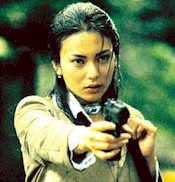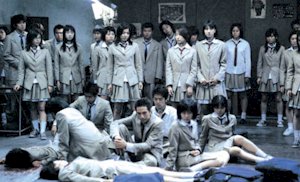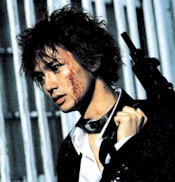|
|
|
|
|
|
|
|
|
|
|
Battle
Royale |
|
|
|
|
intro by Kozo | review
by LunaSea |
commentary by LunaSea |
availability | |
|
  
(left) Kou Shibasaki, (center) just another day at school,
(right) Masanobu Ando |
|
Year:
|
2000 |
|
|
|
Director:
|
Kinji
Fukasaku |
|
|
|
Cast:
|
Takeshi
Kitano, Aki Maeda, Tatsuya Fujiwara, Masanobu Ando, Taro Yamamoto,
Kou Shibasaki, Chiaki Kuriyama |
|
|
The
Skinny: |
A
terrific film from director Kinji Fukasaku. Shockingly powerful,
technically excellent and possessing of enough thrills to
satisfy the exploitation fan. This is a keeper. |
|
|
Intro
by Kozo: |
The
following review and commentary were written by Lee Wong before
his passing this past year. Originally his writing was a mixture
of both pieces, and was deemed somewhat rambling by both he
and I. It was then decided that I could write a review, and
he could do the commentary.
We never did get around
to collaborating on the piece. This writing on Battle
Royale was shelved, and though I've looked at it
since, I never spent much time working with it. However,
lately I've been hearing many requests for this site
to review Battle Royale, which is odd because
it's been written about on every Asian Cinema site EVER.
I really didn't think we had anything more to say about
the film, and I still feel that way. But, I've decided
to publish Lee's review nonetheless, if anything because
his comments are infinitely more incisive than mine
could ever be. (Kozo 2002) |
|
|
Review
by LunaSea: |
As
Kinji Fukasaku's film begins, we see TV cameras frantically
trying to capture the winner of the last Battle Royale,
a plan advised by Japan to combat youth violence. A bloody
young girl looks up with a menacing, disturbing grin on her
face, preparing us for what's to come. Looking at the premise
of such a film—at least on the surface—you might
expect to see a gory exploitation thriller trying to spoof
and critique the worldwide craze for reality TV. However,
this film is much, much more.
In the world of Battle Royale,
Japan has reached a 15% unemployment rate. Faith in society
and the school system has been lost, and kids have rebelled
by choosing not to attend. They no longer respect adults or
their teachers. It's because of this widening gap that the
adults have enacted the BR Act, which stipulates that one
randomly chosen ninth grade class be sent to a remote island
for a three day game. They're each given a map, food, a random
weapon (anything from a pot lid to a gun) and an explosive
collar. That collar will detonate if removed, or if the kids
attempt to flee. Occasionally "hot zones" are created,
which will detonate your collar if you happen to be in them
at the improper time. And, at the end of three days, if more
than one student is left, everyone dies. It's kill or be killed,
survival of the fittest. It's just like school, or modern
society.
Battle Royale is based
on a novel which presented this not-so-alternate world, and
explored the motivations of the kids and the adults.
However, instead of translating the book's exposition, Fukasaku
decided to just let the characters speak for themselves. Having
more social commentary could have been interesting, but it
might have made the film heavy handed, and possibly even ruined
it. By communicating his vision via storytelling and character
development, Fukasaku has made the film better than one would
expect. He adds a lot of black humour, as many deaths are
overly-dramatic and almost cheesy, but once you get accustomed
to the world, the film begins to dig deeper.
Ultimately, the film offers
some strong themes and raw, unflinching power. From what could
have been a simple game of sparring cats and dogs, Fukasaku
transitions into a reflection on the idea of teamwork, which
once was the foundation of Japanese society. Over time, such
teamwork has shattered under pressure, and longtime friendship
has vanished from the fear of trusting others. The most powerful
scenes of the film involve students trying to form a team
and then failing as their trust dissolves due to fear and
insecurity. In the final act of the film, Fukasaku seems to
suggest that the only way to overcome your troubles is to
trust someone wholeheartedly, and to try and solve problems
together. He also seems to encourage today's youth to "run
for it," to be confident and believe in themselves. This
is a message that applies to the society of Battle Royale,
modern Japan or even anywhere else.
Fukasaku's double-edged direction
is much appreciated: he certainly doesn't hold back anything
in terms of violence, but he's rather subtle in other ways.
Teacher and BR Act taskmaster Kitano (Takeshi Kitano) has
his own problems, which are as telling as the plight of the
kids, and equally as relevant. Fukasaku deals with heavy themes,
but never lets his social commentary overwhelm the action
aspects. You could approach this film as unadulterated, albeit
dark, fun and the film delivers. The dramatic sequences are
not over-emphasized, and if they are then Fukasaku is poking
fun at them. As a result, the film never feels manipulative
or eager-to-please. Battle Royale also features a great
deal of suspense, and uses death toll alerts in much the same
way that High Noon used the clock on the wall. In that
film, the clock paced the film perfectly up until the final
battle, and the roll call of the dead achieves the same thing
in Battle Royale.
This is clearly more of a director's
film than an actor-driven one, but many of the teenagers offer
solid performances, even when their characters ask for emotional
restraint. Takeshi Kitano is magnificent as usual, and Masanobu
Ando is fine as the psychotic outsider who never speaks. The
film has a brilliant soundtrack as well, using famous classical
pieces that evoke the work of John Woo and even Stanley Kubrick.
And while the violence is certainly graphic and shocking,
it feels right given the circumstances.
The violence in Battle Royale
also led to the usual ruckus by hypocritical politicians,
once again trying to suppress truth that doesn't benefit them.
However, all the blood and guts only make the film stronger.
Kinji Fukasaku convinces with an intelligent mix of social
commentary and raw, shocking action. Battle Royale
is a terrific film, and makes one think about what's beyond
all the violence that surrounds us. (LunaSea/Kozo 2002)
|
|
|
Commentary
by LunaSea: |
Kinji Fukasaku, one of the most underappreciated directors
from Japan, has been shooting controversial, dark and shocking
films for over four decades. His primary genre has been the
gangster film, though he's occasionally journeyed to other
genres such as musicals or science fiction. His past works
changed the way gangster movies were done. Instead of using
gangsters as a tool to tell a story, he explored the reasons
behind the actions his characters took. Quite often, his characters
were a product of their times, and not simply genre types.
His work from the sixties and
seventies criticized Japan's post WWII rebuilding, which benefited
only certain sectors of the population but also made many
people so poor they lost hope. Japan simply tried to force
the poor out of this new society. And, by maintaining that
most problems could be solved with the easy dogma and promise
of democracy, Japan relegated the weak to the darker sides
of society. Japan forced the people into poverty which in
return generated crime. Gone was the Yakuza code of honor,
which is still glamorized to this day in films across Asia.
Fukasaku's penchant for social
commentary doesn't seem to dissipate with Battle Royale.
Here, he explores the consequences for the generation that
rebuilt Japan in the seventies, but also experienced the bubble
economy crash of the nineties. Many people have pointed out
that Battle Royale is a film about Japan's present
youth, but it covers much more than that. The film explores
the generation gap between today's youth with the youth of
the seventies, and the two completely different worlds they
inhabit. The confidence that led Japan to the top is no more,
and nowadays studying and excelling in the best schools doesn't
guarantee you a job.
For that reason and many others,
the adults of today are dissatisfied by how their lives have
turned out, and have lost confidence—an integral part
of Fukasaku's message. Try to ask yourself why he paints such
an apocalyptic demise for Japan's current youth. He criticizes
adults for trying to educate their kids the way their parents
educated them, a formula which obviously no longer works,
in Japan and perhaps anywhere else. Their generation tried
to suppress any kind of rebellion with the hope of democracy,
but instead the role of the family—as well as authority
and society—all changed.
The kids portrayed in Battle Royale
are directionless, surrounded by an anarchy they don't understand
and don't want to change. They're perfectly happy in their
limited cosmos, and eschew all forms of responsiblity. The
highly competitive school system has become even more stressful,
because at this point nothing is sure. A good grade can mean
the world to these ninth graders, even to the point that they
would commit suicide over it. In Battle Royale, the
students refuse to accept this situation and stop going to
school, They stay home and wander without direction, committing
acts of random violence. The world Fukasaku paints is certainly
hard to digest, but it's not too different from reality, nor
from his own personal history. The problems in Battle Royale
are the same Fukasaku experienced when he was young, but just
under the guise of a different dogma. (LunaSea 2002) |
|
|
Availability:
|
DVD (United Kingdom)
Region 0 NTSC
Tartan Video
16x9 Anamorphic Widescren
Japanese Language Track
Dolby Digital 5.1
Removable English Subtitles |
DVD (Hong Kong)
Region 3 NTSC
Universe Laser
Widescreen
Japanese Language Track
Dolby Digital 5.1
Removable English and Chinese Subtitles |
|
|
|
|
 |
|
| |
|
images courtesy
of stareastnet.com and www.mov3.com
|
|
|
|
|
|
|
|
|
|
|
|
| LoveHKFilm.com
Copyright ©2002-2017 Ross Chen
|
|
|